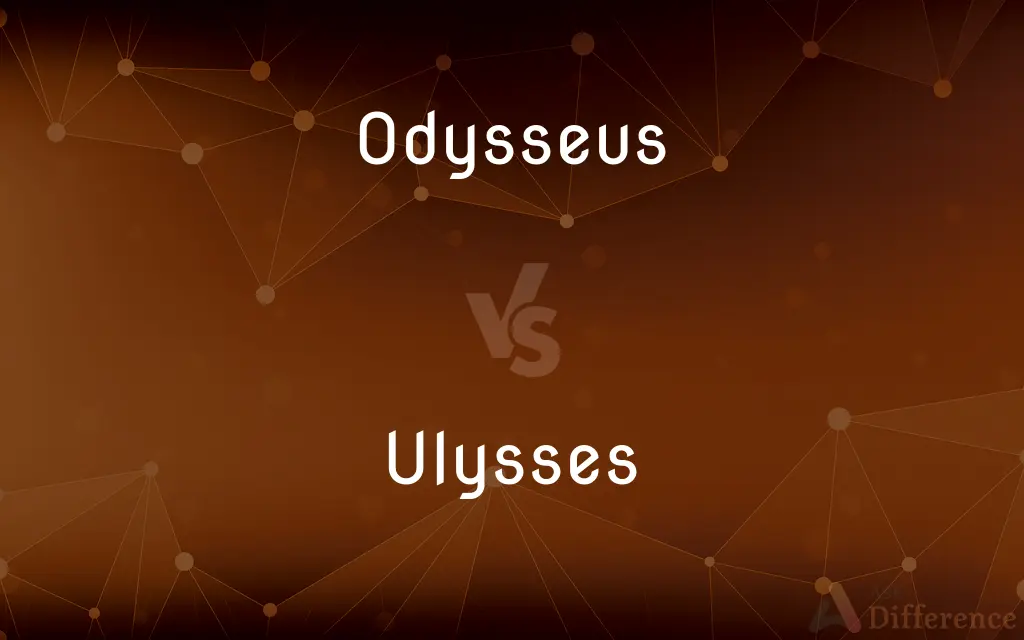Odysseus vs. Ulysses — What's the Difference?
Edited by Tayyaba Rehman — By Urooj Arif — Updated on March 22, 2024
Odysseus, a key figure in Greek mythology, is known for his cleverness and role in the Trojan War, whereas Ulysses is the Latinized version of his name, used in Roman mythology and later European literature.

Difference Between Odysseus and Ulysses
Table of Contents
ADVERTISEMENT
Key Differences
Odysseus is a central character in Homer's epic, "The Odyssey," renowned for his intellect, strategy, and the arduous journey back home to Ithaca after the Trojan War. Whereas Ulysses, the Roman adaptation of his Greek name, is often associated with Roman literature and is the protagonist of Dante's "Inferno" and Tennyson's poem "Ulysses," emphasizing themes of exploration and existential introspection.
Odysseus' story is deeply embedded in the context of Greek mythology, portraying him as a hero facing numerous challenges and monsters, symbolizing personal growth and heroism. On the other hand, Ulysses in Roman and later literature is depicted more as a figure of relentless curiosity, embodying the Renaissance man's quest for knowledge and discovery beyond the known world.
The depiction of Odysseus in Greek literature primarily focuses on his cunning and tactical mind, such as his idea of the Trojan Horse, which led to the fall of Troy. Ulysses, however, is often highlighted for his philosophical insights and the moral and existential questions he confronts, especially in the works of Dante and Tennyson.
Odysseus' character is pivotal in exploring themes of loyalty, homecoming, and the challenges of the human condition, showcasing his struggles to return to his wife Penelope and son Telemachus. Ulysses, in contrast, sometimes explores broader themes of longing, the relentless pursuit of ambition, and the desire to surpass human limits.
In Greek mythology, Odysseus' cleverness is celebrated through his many ruses, including escaping Polyphemus the Cyclops. Ulysses' character in later narratives often embodies a more introspective wisdom, contemplating life's fleeting nature and the pursuit of eternal knowledge.
ADVERTISEMENT
Comparison Chart
Origin
Greek Mythology
Roman Mythology and European Literature
Key Themes
Heroism, Cunning, Homecoming
Exploration, Existential Search, Ambition
Literary Works
"The Odyssey" by Homer
"The Divine Comedy" by Dante, "Ulysses" by Tennyson
Character Traits
Intellect, Strategy, Resilience
Curiosity, Wisdom, Restlessness
Symbolism
Personal Growth, Heroism
Quest for Knowledge, Transcending Limits
Compare with Definitions
Odysseus
Protagonist of "The Odyssey," facing myriad challenges.
Odysseus encountered Sirens during his journey.
Ulysses
Roman name for Odysseus, featuring in later European literature.
Ulysses is a central figure in Dante's Inferno.
Odysseus
A Greek hero known for his wit and role in the Trojan War.
Odysseus devised the Trojan Horse strategy.
Ulysses
Often associated with the quest for knowledge and truth.
Ulysses' journey in The Divine Comedy symbolizes a spiritual quest.
Odysseus
Symbol of cunning and resourcefulness in Greek mythology.
Odysseus cleverly escaped the Cyclops.
Ulysses
Reflects on life's existential questions in narrative works.
Ulysses' speeches often ponder the nature of existence and destiny.
Odysseus
Renowned for his intellect and tactical genius.
Odysseus' strategies were crucial in the Greeks' victory in Troy.
Ulysses
Represents the archetype of the explorer in literature.
Tennyson's Ulysses yearns for new adventures despite his old age.
Odysseus
Embodies themes of loyalty, perseverance, and homecoming.
Odysseus' long journey reflects his determination to return to Ithaca.
Ulysses
Embodies themes of restlessness and ambition.
Ulysses in literature is depicted as never satisfied with the known.
Odysseus
Odysseus (; Greek: Ὀδυσσεύς, Ὀδυσεύς, translit. Odysseús, Odyseús [o.dy(s).sěu̯s]), also known by the Latin variant Ulysses (US: , UK: ; Latin: Ulysses, Ulixes), is a legendary Greek king of Ithaca and the hero of Homer's epic poem the Odyssey.
Ulysses
Odysseus.
Odysseus
The king of Ithaca, a leader of the Greeks in the Trojan War, who reached home after ten years of wandering.
Ulysses
Roman misspelling for Odysseus
Odysseus
(Greek mythology) a famous mythical Greek hero; his return to Ithaca after the siege of Troy was described in the Odyssey
Common Curiosities
What are the main differences between Odysseus and Ulysses?
The main differences lie in their cultural origins and the themes they represent in literature; Odysseus is associated with Greek heroism and homecoming, while Ulysses explores themes of exploration and existential inquiry.
Who is Ulysses?
Ulysses is the Latinized version of Odysseus, used in Roman mythology and European literature.
In which epic is Odysseus the protagonist?
Odysseus is the protagonist of Homer's "The Odyssey."
Why is Odysseus considered a hero?
Odysseus is considered a hero for his bravery, intelligence, and determination in overcoming obstacles on his journey home.
Who is Odysseus?
Odysseus is a hero from Greek mythology, known for his cleverness and the journey home after the Trojan War.
What does Ulysses symbolize in literature?
Ulysses symbolizes the eternal quest for knowledge, the spirit of exploration, and confronting existential truths.
How are Odysseus and Ulysses similar?
Both represent the same historical figure through different cultural lenses, embodying traits of intelligence, adventure, and exploration.
How do Odysseus' strategies in the Trojan War highlight his character?
His strategies, like the Trojan Horse, showcase his innovative thinking, tactical genius, and ability to lead and inspire.
How does Ulysses' character differ in Dante's "Inferno"?
In "Inferno," Ulysses is portrayed as a bold explorer, pushing the boundaries of human knowledge and experience, which leads to his eventual downfall.
What lesson can be learned from Odysseus' journey?
Odysseus' journey teaches the value of perseverance, wisdom, and the enduring nature of human spirit against adversities.
What symbolizes Odysseus in Greek mythology?
Odysseus symbolizes cunning, heroism, and the human struggle for home and identity.
How does the depiction of Odysseus and Ulysses reflect their respective cultures?
Odysseus reflects Greek values of cunning, heroism, and loyalty, whereas Ulysses reflects Roman and later European values of intellectual curiosity and the quest for broader horizons.
What themes does Ulysses represent in Tennyson's poem?
In Tennyson's poem, Ulysses represents themes of unyielding exploration, aging, and the desire to seek new experiences beyond the familiar.
What is the significance of Ulysses in modern literature?
Ulysses signifies the timeless human urge to explore and understand the world and ourselves, challenging readers to contemplate life's deeper meanings.
Share Your Discovery

Previous Comparison
Methionine vs. Valine
Next Comparison
Reply vs. SurreplyAuthor Spotlight
Written by
Urooj ArifUrooj is a skilled content writer at Ask Difference, known for her exceptional ability to simplify complex topics into engaging and informative content. With a passion for research and a flair for clear, concise writing, she consistently delivers articles that resonate with our diverse audience.
Edited by
Tayyaba RehmanTayyaba Rehman is a distinguished writer, currently serving as a primary contributor to askdifference.com. As a researcher in semantics and etymology, Tayyaba's passion for the complexity of languages and their distinctions has found a perfect home on the platform. Tayyaba delves into the intricacies of language, distinguishing between commonly confused words and phrases, thereby providing clarity for readers worldwide.
















































